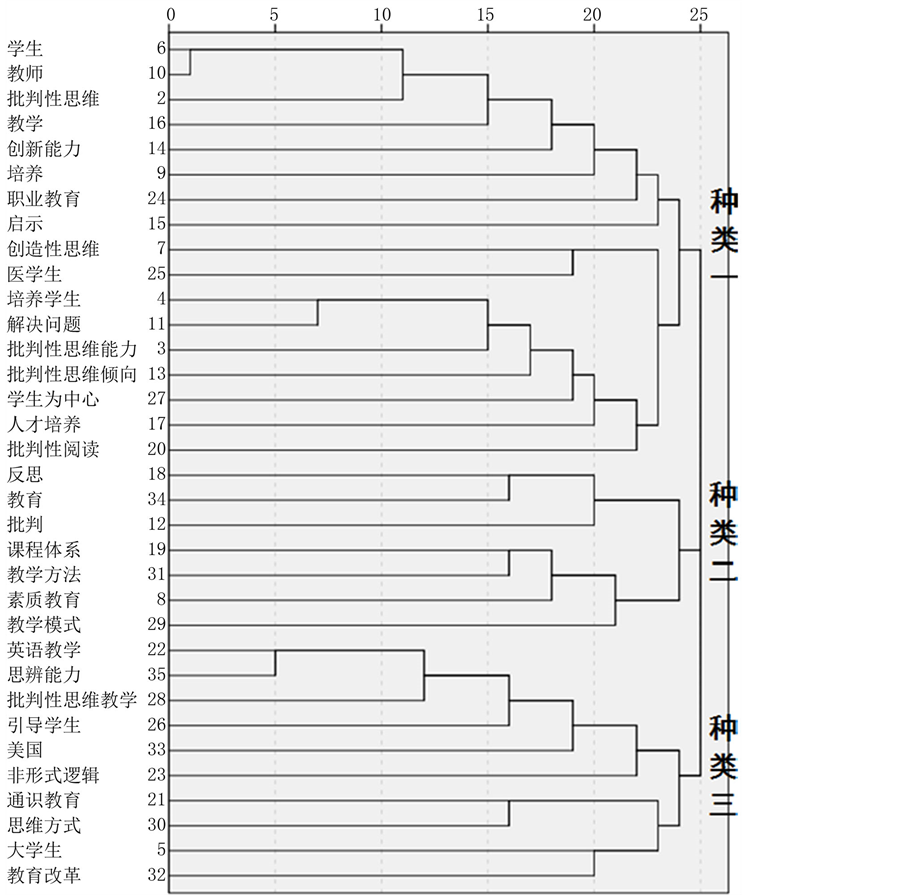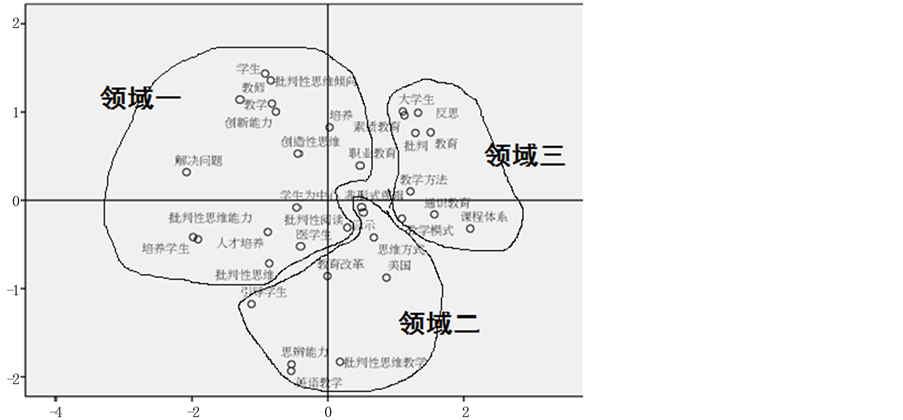1. 引言
1998年10月联合国教科文组织在法国巴黎召开“世界高等教育会议”将培养大学生的批判性思维列为未来高等教育的重要目标,并将此目标写进了会议重要文件——《面向二十一世纪高等教育宣言:观念与行动》,该宣言第一条明确指出:教育与培训的使命是培养学生批判性和独立的态度(联合国教科文组织,1998)。鉴于学术界对于批判性思维定义的纷争,美国哲学协会于1991年通过德尔菲法,得出了专家相对一致的定义:“我们认为批判性思维是有目的的、自我校准的判断。这种判断表现为解释,分析,评价,推断以及对判断赖以存在的论据、概念、方法、标准或语境的说明”(Facion, 1990)。心理学领域的定义主要见诸于朱智贤、林崇德的观点:批判性思维是指思维活动中善于严格估计思维材料和精细地检查思维过程的智力品质,是思维活动中独立分析和批判的程度,批判性思维应作为问题解决和创造性思维的一个组成部分(朱智贤,林崇德,2002)。
我国对于批判性思维的研究相对较少,主要是对国外著作的译介,或者从概念上探索批判性思维的重要性,没有形成批判性思维理论体系。要本土化地开展这方面的研究,首先需要梳理和把握我国批判性思维近几年的研究走向,归纳主要的研究领域和重点热点,确定研究的价值。
目前,国际上兴起一种知识图谱为我们研究领域热点提供了可靠有效的技术支持。知识图谱(Mapping Knowledge Domains)可以用直观图像展现出最前沿领域和学科知识的信息会聚点,从宏观、中观、微观等不同层面来揭示一个领域或学科的发展的概貌,使人们便于全面审视一个学科的结构和研究热点、重点等信息(任红娟,张志强,2009)。以这样一个科学的技术绘制分析近几年的批判性思维热点知识图谱,可以有效分析我国批判性思维的研究现状以及趋势,从而更为科学地选择主题与对象,推进我国素质教育。
2. 资料来源与研究方法
2.1. 资料来源
首先,用标准检索的方法在中国期刊总库查找到与“批判性思维”主题相关的文献314篇,选择期刊年限为“2010~2014”近五年的期刊,来源类别限定为“核心期刊”。在此基础上,规范资料,保持检索资料编码格式以及关键词含义的一致性。
2.2. 研究工具
采用Bicomb共词分析软件、SPSS20.0作为研究工具。其中Bicomb共词分析软件由中国医科大学医学信息学系崔雷教授和沈阳市弘盛计算机技术有限公司开发。Bicomb基本操作步骤为:第一,确定研究主题,选取资料;第二,收集并整理资料。将从CNKI收集到的文本格式转化为ANSI编码文件;第三,使用Bicomb软件对关键词进行统计分析:第四,提取出统计的结果:第五,关键词共词矩阵分析,导出共词矩阵(崔雷,2011)。
2.3. 研究进程
首先,确定并抽取主要的要分析的关键词。采用Bicomb软件进行关键词的统计,结果共有关键词1007个。抽取词频大于4的关键词34个作为主要的关键词。其次,建立一个高频关键词的共词频矩阵。对于这34个关键词,利用Bicomb软件中的共词分析功能,产生出共词矩阵。再次,进行聚类分析。将共词矩阵导入SPSS20.0中,采用样本聚类,得出关键词聚类树状图。然后,对共词矩阵做多维尺度分析。最后,绘制出批判性思维研究热点知识图谱,结合文献进行解释分析。
3. 研究结果与分析
3.1. 关键词词频统计及分析
对314篇文章中的1007个关键词进行词频统计分析,共抽取34个高频关键词,其排序结果见表1。
从表1可以通过前34位的关键词排序,初步了解到近五年来我国批判性思维研究领域的集中热点和趋势。具体为,除去批判性思维之外的10个热点分别为:批判性思维能力(25)、培养学生(14)、大学生(13)、学生(12)、创造性思维(10)、素质教育(9)、培养(9)、教师(9)、解决问题(7)。但是,仅对高频关键词的词频统计分析,还难以发现它们间的联系,还需要进一步通过关键词共现技术来深入挖掘它们之间的联系。
3.2. 高频关键词的Ochiia系数相异矩阵及分析
高频关键词的Ochiia系数相异分析的基本原理是,相异矩阵中的数字表明数据间的相异性,其数值越接近1,表明相应的两个关键词之间的距离越远、相似度越小;反之,数值越接近0,则表明关键词之间的距离越小、相似度越大。我们利用Bicomb共词分析软件,将上述34个高频关键词汇进行共词分析,生成词篇矩阵后,再阵导入SPSS20.0,选取Ochiai系数并其转化为一个34 × 34的共词相似矩阵,结果如表2所示。
从表2可以看出,各关键词与批判性思维距离由远及近的顺序依次为:反思(0.000)、通识教育(0.037)、创造性思维(0.136)、非形式逻辑(0.146)、素质教育(0.191)、培养学生(0.196)、大学生(0.204)。这个结果表明,在提到批判性思维时,人们会先想到大学生和培养学生,而较少联系反思和通识教育。由表2的数据得:已有批判性思维研究成果,较少会涉及反思和通识教育,研究对象主要是大学生,并且致力于培养学生的批判性思维,这点与现有研究一致(赵江涛,2009;马慧,姚梅林,仝丽娟,2013;戴迎峰,2013),并且,素质教育与批判性思维的距离也是比较近的,批判性思维的提出并且得到重视,就是我国倡导素质教育的结果,素质教育要求学生具有批判性思维,从而更好地发展其创造性思维。
3.3. 高频关键词聚类图及分析
关键词聚类可以反映关键词间的远近关系,进一步反映批判性思维的研究热点。关键词聚类分析的原理是:分析成对的关键词在同一篇文献中的频率(共词),运用聚类的统计学方法,把几个关系密切的关键词聚在一起形成一个类团。首先以最具影响力的关键词(种子关键词)生成聚类;再次,由聚类中的种子关键词及相邻的关键词再组成一个新的聚类。关键词越相似它们的距离越近,反之,则较远(郭文斌,陈秋珠,2012)。采用SPSS20.0对关键词相似系数矩阵进行系统逐次聚类分析,得到的聚类结果见图1。
根据图1中聚类分析结果显示的类团连线距离远近,将其分为3类。分类1为批判性思维的核心构

Table 1. High frequency keywords
表1. 高频关键词

Table 2. Ochiai coefficient similarity matrix of high frequency high frequency keywords
表2. 高频关键词Ochiai系数相似矩阵(部分)
成和培养(图1中的种类一),由学生、教师、培养学生、批判性思维倾向、批判性思维能力等关键词构成。分类2为批判性思维的教育教学策略(图1中的种类二),由教育、课程体系、教学方法、教学模式等构成。分类3为批判性思维的教学内容和教育改革(图1中的种类三),由英语教学、批判性思维教学、通识教育、教育改革等关键词构成。
3.4. 批判性思维研究热点知识图谱及分析
采用SPSS20.0的多维尺度分析ALSCAL将表2的相异矩阵进行分析,并结合聚类分析结果,绘制出批判性思维研究热点知识图谱,结果见图2。
图2的结果以更直观的形式,不仅向我们再次展示了图1分析的3个具体研究领域结果的可靠性,而且还进一步向我们展示了批判性思维研究主要围绕2大主线展开,它们分别为:培养和教育(左右分)、方法和内容(上下分)。具体来看,培养(左边部分)包括:学生、人才培养、医学生、批判性思维、创造性思维等热点;教育(右边部分)包括:素质教育、职业教育、通识教育、课程体系等热点;方法(上边部分)

Figure 1. Critical thinking research keyword clustering map
图1. 批判性思维研究领域关键词聚类图
包括:反思、解决问题、批判等热点;内容(下面部分)包括:批判性阅读、批判性思维教学、英语教学等热点。从图2中3个具体研究领域的分布情况看,我国批判性思维研究主要停留在笼统的概念和培养层面的探讨,而对于科学的实证研究并不多见;研究对象主要是大学生和医学生,青少年则非常少,根据皮亚杰认知发展理论,青少年处于形式运算发展阶段,批判性思维等抽象思维在发展,而发展的关键期很可能在青少年的某一阶段,这对于批判性思维的培养至关重要。对于青少年的研究,主要是将批判性思维运用到单科教学中,忽略了批判性思维发展的普遍性。因此,加强青少年批判性思维的实证研究,可以有效地推进教育教学改革,提高我国素质教育。
4. 结论与展望
综上所述,知识图谱法比较直观的反映出了我国近5年的批判性思维研究主要围绕两大主线和三个具体领域展开情况。通过对多维尺度图和聚类分析图的进一步归纳分析,还可以归纳出我国近五年批判

Figure 2. Critical thinking hotspot knowledge map
图2. 批判性思维研究热点知识图谱
性思维研究的总特点:研究对象主要是大学生,特别是医学和护理专业,主要原因是美国批判性思维教育运动最初是在护理专业内开展的,美国护理专业人才培养中对批判性思维非常重视。相对而言,我国医学教育中受美国的影响较大,开展的范围相对较广,因而,在医学教育领域内开展批判性思维的研究相对较多(刘义,2010);研究内容主要是批判性思维的培养,未进行深入客观的实证研究;从单科教学来研究批判性思维,忽略了其存在的普遍性(曹琴,2013;刘静,2013;蔡立颖,2010)。整体来看,文献的增多,包括硕博论文的增多体现着这一研究领域越来越受到重视,这是比较乐观的。

NOTES
*通讯作者。